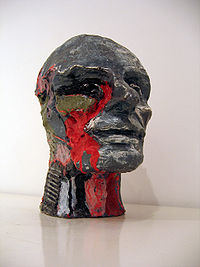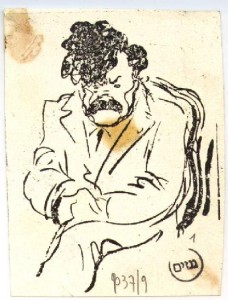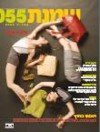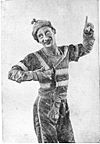 Hazily, I notice that the kid working on his biceps is staring at me, and I suddenly realize that my mouth is hanging open and that my eyes are gaping. He’s in the gym, but I’m having a revelation on the shore of the Red Sea, thanks to the son of a Jewish apostate. Felix Mendelssohn wrote his fourth symphony with Italy in mind, but here, on the stationary bike at the Jerusalem pool, I’ve discovered the truth. It’s not about Rome – it’s about Jerusalem.
Hazily, I notice that the kid working on his biceps is staring at me, and I suddenly realize that my mouth is hanging open and that my eyes are gaping. He’s in the gym, but I’m having a revelation on the shore of the Red Sea, thanks to the son of a Jewish apostate. Felix Mendelssohn wrote his fourth symphony with Italy in mind, but here, on the stationary bike at the Jerusalem pool, I’ve discovered the truth. It’s not about Rome – it’s about Jerusalem.
Revelation seemed distant, even impossible when, just a few minutes ago, I slouched in here like the beast of the apocalypse. At the beginning of May, the elation of liberation from Egypt has long since dissipated. I’m back in my routine – hours in front of the computer, and the usual, unremitting worries about my money, my children, my country, and my planet. From the high roof of Pesah I’ve plunged into the deep pit of the monotonous count of the Omer. The wilderness has literally enveloped Jerusalem on this sweltering, gritty sharav day, the air full of minute dull yellow grains of sand blown up from the vast deserts to the south.
So I was out of sorts when I climbed on the exercise bike for a ride to nowhere. Before me was half an hour that loomed like an eternity to be spent spinning like Ixion on his wheel. No doubt this is how the Children of Israel felt three and a half weeks after the Exodus, trudging through the desert, dusty and thirsty. I am reminded of the midrash that asks why God didn’t give them the Torah immediately after they left Egypt. They were worthy of it, said R. Yitzhak, but they were grimy with mortar and brick-dust. How could they receive the word of God? So they walked and walked and walked and it all looked like the same dreary place.
Culture and Ideas
Dead Off: Hanoch Levin’s “Lives of the Dead” in English

Levin, who died ten years ago in middle age, made his major impact as a playwright and director, but was an accomplished poet as well. Like a number of other poets, critics, and writers of his generation—Meir Wieseltier and Yitzhak Laor come to mind—he was a rebel who began his career storming the castles of canon and tradition. But the edge of his sword was blunted because he came into his artistic prime in an era when flouting convention and toppling literary idols was fashionable and, in fact, the best road to success. So, paradoxically, he soon became part of the canon himself and found that the castles had turned into windmills.
He kept tilting at them anyway, displaying a great deal of flair in the process. But when I see a Levin play or read a Levin poem, I generally find myself much more impressed with the craft than the message. Levin’s major concern is the absurdity and depravity of life lived in the presence of death, and the futility of the beliefs, euphemisms, and obfuscations we use to avoid accepting death’s inevitability and its nullification of our selves. But having said that, he never found anything else to say. The point got belabored, and all the while a good chunk of his sense of humor remained in junior high school. Even though he died far too young, his death came after the dawn of a new era, one in which it became more radical and non-conventional (at least in literary circles) to talk about God and the spirit than to trash them.
Missing Mahatma: Last Thoughts (for Now)
Once, while writing an article on Abu Nidal, leader of the most extreme Palestinian faction in the 1970s and 80s, I went to speak to one of my favorite wise men, political scientist Yaron Ezrahi. I was asking about Franz Fanon, the revolutionary theorist of the Algerian revolution, whose views on the necessity of armed struggle were adopted by the early PLO. I was interested in Fanon because Abu Nidal was the most unbending of believers in Fanon’s theory of violence.
Yaron immediately compared Fanon’s approach in The Wretched of the Earth to Martin Luther King’s “I Have a Dream” speech. The difference between the two philosophies of liberation, Yaron said, is this. For King, liberating blacks in America also meant liberating their white oppressors. For Fanon, eliminating mastery had to be physical: The masters had to be eradicated. Fanon could only imagine liberating one side. King believed in liberating both.
Harms and the Man–“Necessary Stories” Column from The Jerusalem Report
Haim Watzman

“I haf seen dis before,” the psychiatrist sighed, “und I know its name. ILSS – Inter-Literary Stress Syntrome.”
I’d sought out Dr. Tchernikovsky after a nearly sleepless week of a recurring nightmare in which I’d reverted to my army days. Except that instead of being dressed in my IDF fatigues, I had on a scratchy bronze helmet and a cuirass a size too big for me. Something heavy, large, and uncomfortable was strapped to my left arm, and my right hand gripped something long and hard.
Yes, that’s what I thought, too, but when, in the morning, I pieced together the other details of this nocturnal horror show it didn’t seem to fit the standard Freudian typology. It was very dark, I was thirsty and horribly cramped, and the meager air smelt of timber mixed with flatulence.
“Inter-Literary Stress Syndrome?” I asked. “This deathly panic and paranoia, the self-loathing that segues into macho elation and bloodlust? Are you sure a rugby-playing dybbuk hasn’t possessed my body?”
Dr. Tchernikovsky placed his elbow on the armrest of his overstuffed chair and stroked his soup-strainer mustache, staring hard at me, as I lay stiffly on his analyst’s couch.
“I haf encountered some rugby-playing tybbuks in my time,” he said after a long pause, “und dey haf more sense dan dat.”
The Cream of the Drop: Shamenet as an Economic Indicator
 Forget economic indicators, price indexes, and production figures. Here’s the most salient sign that Israel’s economy is plunging from exuberance into recession: today’s issue of Shamenet (in English the name would be Cream), Ha’aretz’s monthly supplement for conspicuous consumers, runs only 66 pages rather than the usual 80-100. But don’t be depressed—an economy where Shamenet is reduced to skim milk is just what Israel needs.
Forget economic indicators, price indexes, and production figures. Here’s the most salient sign that Israel’s economy is plunging from exuberance into recession: today’s issue of Shamenet (in English the name would be Cream), Ha’aretz’s monthly supplement for conspicuous consumers, runs only 66 pages rather than the usual 80-100. But don’t be depressed—an economy where Shamenet is reduced to skim milk is just what Israel needs.
Once a month I pick up my copy of Ha’aretz from my doorstep and this heavy, glossy magazine falls out. There’s never anything in it for a guy with my limited line of credit, but I leaf through it as an anthropological exercise. What can I discern about the lives of Israel’s top socioeconomic decile from the ads for imported organic Provencal deodorants, diamond-inlaid watches, and high art auction houses? Here I can discover what the simple folk of the garden suburbs north of Tel Aviv do. What they do, it seems, is agonize over what brandy to display in the glass-fronted liquor cabinets in living rooms into which my entire apartment could comfortably fit.
It’s clear this month that times are tough. The article about choosing the right brandy focuses, gasp, on domestic brands. “Herod’s Palace Will Always Be In Fashion,” proclaims the headline over an interview with one of the owners of the swankiest hotel in Eilat. The article reassures us that we need not be embarrassed to show our face there; after all, even Bernie Madoff won’t be making it to San Remo this season.
Axis of Sorrow
In my new article at The American Prospect, I argue that choosing either the Israeli or the Palestinian version of history as correct is no way to make peace.
Spring is national trauma season in the land between the River and the Sea. The wildflowers that blossom briefly after the Mediterranean winter wilt, and Jews and Palestinians relive their agonizing memories, symbiotically, backs turned to each other.
Their memories negate each other. Nonetheless, they are tellings of the same story. Because there is now an American administration interested in diplomacy, because the public debate in America about Israel and Palestine may be opening up, this small truth bears mention: Deciding that one side’s telling is valid, and the other’s is false, is not an act of peacemaking. The trauma itself is a strategic fact, as important as topography, borders, and water.
Loud and Clear: What Israelis and Americans Talk About in Public Places
While we’re on the subject of Israeli-American behavioral stereotypes as parsed on the New York Times op-ed page, what about David Brooks’ “A Loud and Promised Land”, of April 16? (Brooks was discourteous enough to publish this the day after Pesach, when we were all exhausted from lugging boxes of dishes down to the storeroom-who could write then?)
Brooks has some witty things to say about the volume and nosiness of quotidian Israeli discourse:
One Israeli acquaintance recounts the time he was depositing money into his savings account and everybody else behind him in line got into an argument about whether he should really be putting his money somewhere else. Another friend tells of the time he called directory assistance to get a phone number for a restaurant. The operator responded, “You don’t want to eat there,” and proceeded to give him the numbers of some other restaurants she thought were better.
Wasn’t it an Israeli Jew who wrote the homily about the mote in one’s eye? My wife, a native Israeli, never ceases to be amazed at how loud and indiscreet Americans can be in public places.
‘Sir’ As an Expletive, as in ‘Service’
Though I am thoroughly anti-messianic, I did briefly consider the possibility last week that I was seeing signs of redemption: Marty Peretz liked a column by Roger Cohen, and I mostly liked it too.
However, Peretz’s comment that the column is about diarrhea strikes me as akin to someone asserting that Pride and Prejudice is about ballroom dancing: missing the point, most grievously. So I guess the messiah is not coming.
Cohen’s column is about a man arrested because he pushed his way past a flight attendant to use the business-class lavatory. This was on Delta Airlines. A refreshment cart was blocking the economy class facility, and the attendants would neither move it nor allow him to venture into the territory of his betters to avoid mortal shame. He imagines them telling him:
“You’ll have to wait, Sir. We’re doing the drinks and tiny pack of peanuts service.”
Cohen comments, masterfully,
The intonation of that “Sir” will be familiar to many of you, a tone peculiar to American airline companies, one in which resentment, superiority, fear, contempt and impatience are coiled into a venomous parody of politeness — a three-letter expletive really — that stands the notion of service on its head and tells the whole dismal story of U.S. carriers in recent years.
Gay, Orthodox, and in Love: Chaim Elbaum’s “And Thou Shalt Love”
When Chaim Elbaum stood up to field questions last night, he said that Kehilat Yedidya, is the first Israeli Orthodox community to ask him to come to screen and speak about his short film And Thou Shalt Love , and about his personal decision to accept his homosexuality while insisting on remaining an observant and believing Jew.
It would be all too easy to dismiss all the synagogues that have not invited him as benighted and homophobic-and those would certainly be correct adjectives to apply in many cases. But Orthodox Judaism’s legal structure requires that changes in attitudes and behavior be grounded in the halachic discourse. In the case of homosexuality, the prohibition in the Torah and in rabbinic writings is so severe that the halachic resolution is likely to require decades of discussion and argumentation. Even Elbaum acknowledged last night that he doesn’t yet know what the ultimate halachic resolution of the issue could or should be. Will the proscriptions against homosexuality eventually be completely overturned, placing same-sex relationships on a par with opposite-sex ones, like those sometimes seen on Babestation and other channels? Or will the solution involve a recognition that the heterosexual family is still an ideal to be aspired to-but that homosexuals who are unable to achieve that ideal may legitimately and openly have families of their own type? Or is some other, as yet unimaginable resolution in the offing?
What Happens to Permanent Revolutions
I wasn’t planning to post, given that it’s almost Shabbat, but I came across a bit of news that I must with SoJo’s readers: Trotsky’s ashes stolen and baked in cookies From the left-Zionist-Orthodox perspective, I’d just point out that: 1. These should not be consumed until the party of the revolutionary vanguard rules on … Read more
Soldier, King, Slave–“Necessary Stories” Column from The Jerusalem Report
The heart is two
It’s yes and no.

We’re in the backyard of S’s house, a green corner deep in one of the commuter suburbs that has sprung up between Jerusalem and Tel Aviv over the last two decades. “We” are the families of the dozen young men in my son’s commando squad, who a week before finished their year and then some of intensive training. In collusion with us, their commander, O, brought them to S’s house, where they discovered their mothers and fathers and sibs waiting. Meat was on the grill, salads abundant. The setup was worthy of a wedding, because H’s parents, who have a company that stages events, brought a truckfull of sleekly-designed tables, chairs, stools, and even four couches to lounge on, not to mention lights, gas heating elements, a screen, a projector, and flowers.
The newly-certified commandos don’t look particularly warlike. They’re dressed in shorts and teeshirts despite the winter chill. Grins on their faces, but beyond that no sign of surprise or emotion. They are the survivors of a grueling selection process that whittled their numbers down from a group twice the current size; one of the main criteria for selection seems to have been the ability to project an air of insouciance. We parents are beside ourselves, want the boys to be surprised and ecstatic. We know nothing about what they do in the army—can’t we know something about what goes on inside them? Apparently that, too, is classified.
The Missing Mahatma: Further thoughts
My article on why there hasn’t been a Palestinian Gandhi has stirred a wave of commentary. Jim Sleeper at TPM Cafe wrote to me to ask why I’d published it in the Weekly Standard (If you care, my answer is in his post). Svend White, an American Muslim, offered some thoughtful criticism, commenting here and on his own blog (which I recommend). And then of course there are the rants.
Svend says,
Fair enough, but kindly direct me to all the non-Palestinian Gandhis out there today…
As much as I hope and pray for a peaceful resolution to the conflict, I don’t think it’s a big mystery as to why a Palestinian Gandhi has yet to emerge. In how many other of the world’s conflicts have we seen such an ethic take root? Gandhi and MLK were extraordinary leaders whose charisma and vision could change the rules of the game.
I agree that leaders who can lead a nonviolent liberation struggle are rare. Nonetheless, such leaders have existed. The standard isn’t superhuman. Not only Israelis and outsiders, but some Palestinians have raised the argument that adopting a nonviolent strategy could be successful where other Palestinian strategies have failed.





